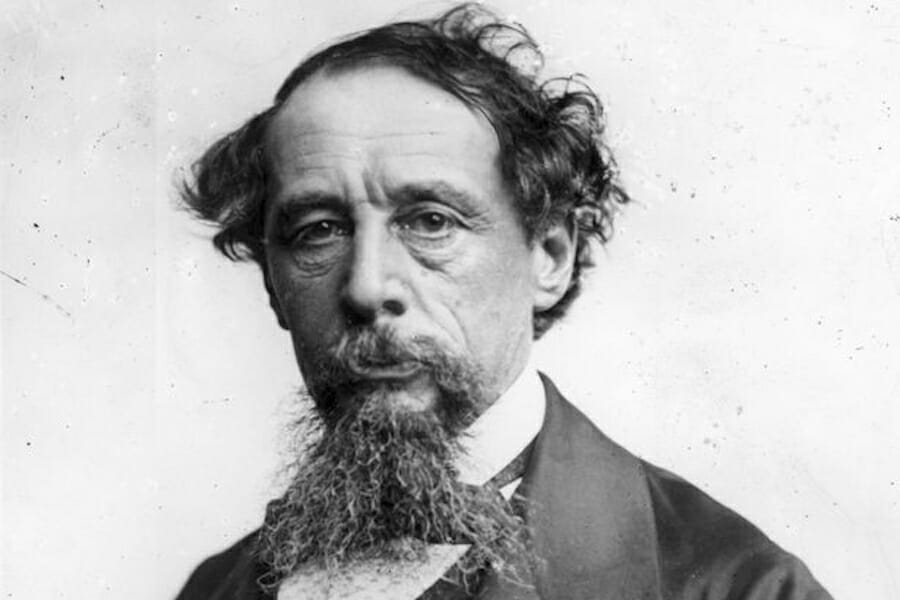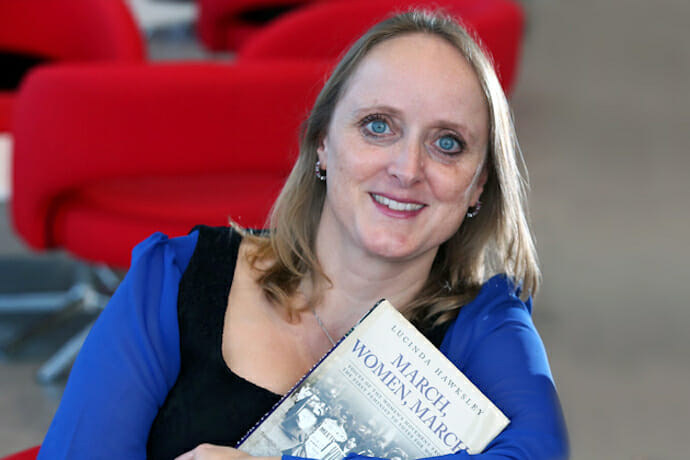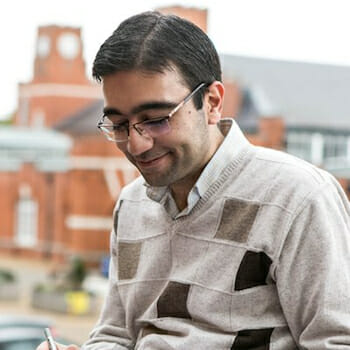
Books
The Life and Literary Contributions of Charles Dickens: Q&A with Lucinda Hawksley
Charles Dickens, the Victorian British author is remembered even today for his novels and novellas like Oliver Twist, Great Expectations, Our Mutual Friend, The Pickwick Papers and David Copperfield.
I had the opportunity to interview Lucinda Hawksley, the great-great-great-granddaughter of Charles Dicken. She is a distinguished member of Charles Dickens’s family and one of his few living descendants. She is an art historian, public speaker and broadcaster specializing in literature, art, history and social history from the 19th and early 20th centuries. As a volunteer speaker of the Whales & Dolphins Conservation Society, Lucinda Hawksley has travelled across the world and appeared on BBC Two, “The Today Programme” and “The One Show” on BBC One.
I contacted Lucinda Hawksley in late 2017 when the city of Rochester in southeast England was gearing up for hosting the Charles Dickens festival to celebrate and enshrine the legacy of the late Charles Dickens.
How do you feel about being the great-great-great granddaughter of Charles Dickens? Does this make you proud of what you do and who you are?
Charles Dickens is a great person to be a descendant of in many ways, because he is so popular all over the world and I really admire his writings. I’ve had great involvements as a result of being a Dickens family member. I’ve been invited to Dickens festivals all over the world and I’m a writer as well, which makes it difficult because then people make associations and try to find similarities in your works and that of your ancestor.
Did the heritage of Charles Dickens or his legacy lead you to literature and the arts in a specific way?
It’s difficult to say that really, because there are several members of our family and I’m the only author. There are far more actors in the family and Dickens was a keen actor. I’m not sure if you’re aware, but Dickens didn’t want to be an author originally.
He wanted to be like Shakespeare; to write plays and act them. It could be genetic or could be coincidence, but there are many non-writers in the family and I’m the only writer, and on the law of statistics, it probably doesn’t have much to do with heritage. Since I was far too young and small, even before starting to read Dickens, I wanted to be a writer and I’m sure it helped with the expansion of literary heritage in the family. I would always read and people always talked to me about writing.
Why does Charles Dickens still attract attention and maintain a large universal audience since his first publications in the late 1830s?
It’s very interesting, and I think it’s partly because he was, and even if he were alive, would be called an observational comedian. His comedy is very good. Even though the language of the time was very difficult, his writings were very easy and people used to complain that he was too populist. Because English language has changed, people think that it’s more difficult now. But he was a real comedian and when he wrote about people, he observed people so well. If you look at Dickens’s characters, even though they are complete parodies, you will still be able to recognize people today. I think that’s what made it work. He spent his whole time, observing people, noting what they looked like, and everybody can relate to that.
I write biographies and historical biographies. And I’ve come to realize that human nature never changes. We live in different time periods, we live under different types of government or religious beliefs, but deep down, we still fear, we still fall in love, we still become jealous, we still have career ambition. All of these are things that Dickens was writing about and are relevant today. That’s what made it work. But also he was just an incredibly good storyteller. So his plots were fascinating, very convoluted and kept people interested. I’m sure you’re aware that Dickens was writing his novels in serial form. So, they looked like an ongoing TV series or radio series and people chewed in every month or every few weeks to read the latest instalment. At least he wrote in that way. When you read the novels, there are lots of cliff-hangers all the way through. When there was a natural break to publish the next instalment, you still have the compulsion of that feeling of turning the page in order to realize what happens next.
There are many writers who publish derogatory and defamatory materials. Charles Dickens never did this. Unity and peace were dominant themes of his writings. How do you see this aspect of his work as compared to his contemporaries?
There’s an important point here. Bearing in mind that what happened was in the 19th century and we are now in the 21st century. When he was writing Oliver Twist, a friend of his who was Jewish wrote to him, saying that, “do you realize that people consider you anti-Semitic because of your creations of Fagan?” So, Dickens changed it in later editions, feeling guilty about it because he didn’t intend to be anti-Semitic. It was the language of the time to refer to Fagan as “the Jew, the Jew, the Jew” all the way through. And so if you look at the later editions of Oliver Twist, he changed it to “the old man.” And Dickens was basing Fagin on a couple of people, one of whom was a criminal called Ikey Solomon, so it was based on reality. Because, Dickens’ friend told him that people in his community were saying “you are being a lot offensive to the Jewish people.”

Dickens then wrote in Our Mutual Friend the character Mr. Riah. He is one of the best characters. He is very kind, and is very good, and is also Jewish. Dickens was extending an apology to the Jewish people. People still get frustrated about Mr. Fagin and say that Dickens was anti-Semitic. But when you look at the hundreds of criminals Dickens wrote, only one of them was Jewish.
He also wrote very angrily about what was known in England in 1857 at that time as the “Indian mutiny” and it was unfortunately what most people in England were writing about it at that time. Now when you look at it, it was really terrible, which unfortunately was language of the time.
He was upset because his son had arrived to work India at the height of rebellion and he was terrified his son was going to be killed in a massacre. He was obviously very scared and angry when he wrote about it. That was one of the other things he was criticized for. But most people realized that Fagin was based on a real person. And also his pointing out of Fagin as a non-observing Jew – he made Fagin cook sausages and people would say, “Oh! He doesn’t understand that a Jewish man won’t cook sausages.” Fagan is not religious. He is not a bad Jewish man. He is only a bad man. When he went to America in 1842 and wrote his travelogue, American Notes – he wrote very angrily about slavery in America. He didn’t understand how America could call itself the land of the free when it promoted slavery of this type. So, he was usually on the side of angels, but not always!
I’ve read the majority of Dickens’ works and can relate to these stories easily and am aware that you have travelled internationally. One of your destinations was Iran. How do young Iranians receive Charles Dickens’ work?
The fact is that I haven’t been to Iran. I wish I had been! I have been to India, Syria and Libya but never to Iran and I’d love to. It’s a country I’d love to see.
Have you any idea how Dickens’ work is received in Iran?
Wherever I have been in the world, if I ever mention Dickens, people always know about him and it’s very well-known that children read Dickens very much, much more than here in the UK I think. And I’m always astonished how people really like Dickens. It’s incredible to me. And he really seems to speak to people, who often watch adaptations of his work on their local TV stations with subtitles. I find it really interesting. It’s wonderful but also intrigues me as to why he has remained so popular.
I once asked a Japanese professor. He told me Dickens is also very popular in Japan and they’ve got one of the largest Dickens Fellowships in the world. He said people in Japan like to think the way they live their life in terms of family, values and morality is what Dickens was writing about in his novels. I’m not saying in his own private life, but in his novels. Perhaps that’s the case in lots of countries. Lots of these observations are valid. He is such a good storyteller. Many of the stories he tells are retold. People like to refurbish stories and retell them. People are retelling the stories of Oliver Twist, Great Expectations, etc. There are so many people who identify with these stories. In many parts of the world, people identify themselves with Dickens’ childhood and the fact that his father was imprisoned and he had to live on his own and be a child laborer, and that’s what makes his word very good. He really understood what he liked to be told. So when he writes about poverty, he really gets it; he understands it. It’s not him standing on a high heel looking down, pretending to understand it. He has been there and as a child, he could feel it and he writes about what we need to know.
What’s the significance of the Dickens Festival in Rochester and the way it has brought the importance of Dickens’ work to the attention of the young people?
Yes, I’m really grateful to the Medway Council for this festival. It’s twice a year and it’s really great to see Medway is embracing its history and every time, you see the streets packed for this festival and Rochester in particular. It’s very good and to me, it’s interesting in the sense that it keeps people interested in literature and keep them talking about books and it’s great to have something based on somebody’s hard work. The same thing happens in Jane Austin museums and I love all of these celebrations and the efforts made to keep the legacy going. And it shows again, as I said before, what a big storyteller he was. Most children, even if they haven’t read him, know the story of A Christmas Carol. There were big film adaptations of this story. It’s such a great story and keeps children and adults similarly interested. I’m determined to read Dickens again. And many of those who haven’t read Dickens at school also make a decision to read him now.
Charles Dickens spent his childhood in Chatham and also lived parts of his adult years there. Did those years impact Dickens’ literary career in a specific way?
The first period of time he spent in Chatham was his childhood when his father worked at the Dockyard. His father worked in the paywall of the navy and it was based in the dockyard. He went to school in Chatham. When he was about 10 or 11, his father’s job moved off to London and Dickens had to leave school and go to live in London, which was a bad happening. Then his father was arrested for theft, and then he had to leave school in London and start working. However, the time that he spent in Chatham as a child really stayed with him and it’s quite often when you read Dickens’s books, you find him writing about the countryside, the seaside and the river. Even though he might be talking about somewhere else, usually when he is writing happily about somewhere, it’s about his time in Chatham and Medway. That was his being in Medway that he considers his happiest.

